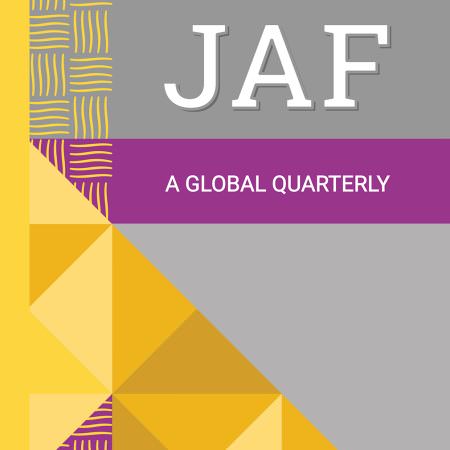Coming Soon! JAF: A Global Quarterly (Summer 2025)

The Summer 2025 issue of JAF: A Global Quarterly (Vol. 138, no. 549) will soon be mailed to subscribers and made available online.
Two articles explore gender, performance, and power.
- “Joy as Resistance in Iranian Lament Performances,” by Zahra Abedinezhad, delves into the mixed affect of joy and mourning that circulates through Muharram performances and beyond as performers and audiences express themselves within the limits of state sanctions in Iran.
- “Of Didacticism and Decapitations: The Mother-in-Law/Daughter-in-Law Relationship in North Indian Women’s Folk Songs,” by Kalrav Vashishtha and Tulika Chandra examine power dynamics in the performance and representation of the mother-in-law/daughter-in-law relationship in women’s folk songs from rural north India, focusing on songs in the Hindi vernacular from western Uttar Pradesh.
Five Perspectives essays, individually and together, tackle some of the complex issues in the field of public folklore amidst changing social and political contexts while offering examples of the impactful work folklorists are doing in a variety of contexts.
- In “Sustaining Support for Community-Led Documentation at the American Folklife Center (and Beyond),” John Fenn and Michelle Stefano bring the perspective of their work at the American Folklife Center at the Library of Congress to explore impacts of the Community Collections Grant program for awardees, their communities, and the Center, while imagining what sustaining the program means in light of the Center’s upcoming fiftieth anniversary. Additionally, the authors pose questions about what it means to sustain the program beyond the federal institutional home in which it originated.
- In “This Needs More Time!: Considerations for Improving Partnerships Between Communities and Institutions in Folklore,” Sarah M. Gordon and Jasper Waugh-Quasebarth with Junious Lee Brickhouse, Ashley Minner Jones, and Naomi Sturm-Wijesinghe discuss the challenges of community-institutional partnerships in the field of folklore, with the goal of advancing adaptability in institutional practices to better support community-engaged work.
- In “Safety in the Field: A Reflection and Progress Report,” Mathilde Frances Lind contextualizes and summarizes two preliminary discussions from professional gatherings that aimed to address folklorists’ safety in the field, with particular attention to how to prepare and support students and junior colleagues. The first articulated eventual goals, such as developing a safety tool kit for fieldworkers, instructors, and public folklore organizations, while the second identified safety needs and challenges and recommended next steps.
- In “A Reflection of What My Folklore Training Brings to My Work in Refugee and Immigrant Services,” Deeksha Nagar draws on 14 years of experience serving immigrants and refugees in Colorado to describe how she uses her training in folklore studies to understand their life stories and to develop and refine strategies for effective cultural education and advocacy practices.
- In “Humanizing Drug Overdoses in Colorado: A Liberatory Harm Reduction Comic Made with Sex Workers and People Who Use Drugs,” a team of arts-based researchers and community advocates, Marty Otañez, Betsy Craft, Nikketa Burges, Ven Talley, and Andrés Guerrero, offers details of a university-research partnership and a brief example of a graphic novel excerpt from the larger project. The graphic novel approach helps to humanize people who use drugs and destigmatize individuals who engage in drug use.
The issue also includes a beautiful tribute to the brilliant scholar, performer, and activist Bernice Johnson Reagon by Amy Horowitz and James Count Early. Their 2023 essay “Bernice John Reagon—In Celebration of Her Eightieth Birthday (Oct. 4, 1942): A Preliminary Inquiry and Invitation to New Generations of Activist Scholars for Further Research” documented her contributions to the field [JAF 136(539):75-95].
The issue features these book reviews:
- A Most Valuable Medium: The Remediation of Oral Performance on Early Commercial Recordings (Bauman with Feaster), by Tim Brooks
- Digital Legend and Belief: The Slender Man, Folklore, and the Media (Peck), by Guro Flinterud
- Mesquite Pods to Mezcal: 10,000 Years of Oaxacan Cuisines (Rodríguez, Morell-Hart, and King, eds.), by José Cutberto Hernández Ramírez
- An Irish Folklore Treasury: A Selection of Old Stories, Ways, and Wisdom from the Schools’ Collection (Creedon), by Joelle Jackson
- The Midnight Washerwoman and Other Tales of Lower Brittany (Luzel), by Nancy Locklin-Sofer
- When Grandpa Delivered Babies and Other Ozarks Vignettes (Rader), by Mariah E. Marsden
- Gods and Mortals: Ancient Greek Myths for Modern Readers (Johnston), by Laura A. Marshall
- Webspinner: Songs, Stories, and Reflections of Duncan Williamson, Scottish Traveller (Niles), by Licia Masoni
- The Poetics of Fire: Metaphors of Chile Eating in the Borderlands (Valle), by Mónica B. Ocasio Vega
- Naomi “Omie” Wise: Her Life, Death, and Legend (Pugh and Minnock-Pugh), by Paul Slade
- A History of Herbalism: Cure, Cook, and Conjure (Kay), by Joanna B. Spanos
- NISHGA (Abel), by Ainjel Stephens
- Claiming Space: Performing the Personal Through Decorated Mortarboards (Bock), by Elizabeth Tucker
- Rethinking the Anthropology of Magic and Witchcraft: Inherently Human (Stevens), by Alf H. Walle
- Jock Duncan: The Man and His Songs (Shepheard, ed.), by Lori Watson
We sometimes make mistakes, and we are happy to correct any errors that you may come across on our site. If you find an error, please let us know using the “submit a correction” link.